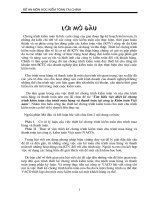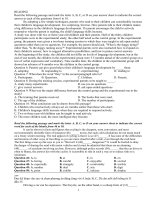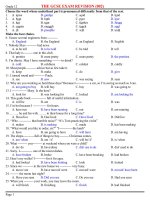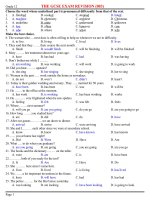GCSE 286
Bạn đang xem bản rút gọn của tài liệu. Xem và tải ngay bản đầy đủ của tài liệu tại đây (66.52 KB, 4 trang )
SƠ GD&ĐT VINH PHUC
TRƯƠNG THPT LIÊN SƠN
(Đề thi gồm: 04 trang)
ĐỀ KTCL ƠN THI THPT QUỐC GIA NĂM 20182019
Mơn: TIẾNG ANH – ĐỀ SỐ 286
Thời gian làm bài: 60 phút, không kể thời gian phát
đề
Ho va tên thi sinh:……………………………………………………………………. SBD:…………………………
Read the following passage and mark the letter A, B, C, or D on your answer sheet to indicate
the correct answer to each of the questions.
In 1988, for the first time in British history, a National Curriculum was introduced. The
National Curriculum tells pupils which subjects they have to study, what they must learn and
when they have to take assessment tests.
Between the ages of 14 and 16, pupils study for their GCSE (General Certificate of
Secondary Education) exams. Pupils must take English Language, Maths and Science for GCSE, as
well as a half GCSE in a foreign language and Technology. In addition, they must also be taught
Physical Education, Religious Education and Sex Education, although they do not take exams in
these subjects.
At the age of 16, pupils can leave school. If pupils stay on, they usually take A (Advanced)
levels, AS (Advanced Supplementary) level or GNVQs (Greater National Vocational Qualifications).
It is quite common to combine, for example, two A levels with one AS level, or one A level with one
GNVQ.
Pupils taking A levels study traditional subjects, such as French, Physics or History. To go to
university, pupils usually need two or three A levels.
AS levels are the same standard as A levels, but only half of the content: AS level German
pupils take the A-level German language exam, but do not take the A-level German Literature
exam.
GNVQs are vocational qualifications. Pupils usually take on GNVQ in subjects such as
Business, Leisure and Tourism, Manufacturing, and Art and Design. One GVNQ (at advanced level)
is equal to two A levels.
Question 1. Pupils need________ A levels to continue to study at university.
A. one or two
B. two or three
C. four or five
D. five or six
Question 2. The word "they" in paragraph 2 refers to________.
A. subjects
B. examinations
C. pupils
D. National Curriculums
Question 3. The word "assessment" in this passage can be replaced by________.
A. donation
B. underestimation C. evaluation
D. satisfaction
Question 4. Britain began to have a National Curriculum_________.
A. in the twentieth century
B. one hundred years ago
C. in the nineteenth century
D. in the twenty first century
Question 5. Which of the following subjects do British students NOT take exams in?
A. Maths
B. English Language C. Physical Education D. Science
Question 6. Pupils normally study for their GCSE between the ages of_________.
A. 12 and 14
B. 14 and 16
C. 15 and 17
D. 16 and 18
Question 7. Which of the following subjects do pupils NOT take on GNVQ in?
A. Art and Design
B. Manufacturing
C. German Literature D. Business
Mark the letter A, B, C, or D on your answer sheet to indicate the correct answer to each of
the following questions.
Question 8. Your car is quite new. It's the same as________.
A. us
B. ours
C. we're
D. our
Question 9. It was not until a few years ago________ playing football.
A. did he start
B. that he started
C. he started
D. had he started
Question 10. Domestic appliances such as dishwasher and washing machines have made________
life much more comfortable.
A. Ø
B. a
C. an
D. the
Question 11. The children who are________ often play tricks on their friends and other people.
A. lazy
B. honest
C. mischievous
D. disobedience
Question 12. Old people need to be________ when they are ill.
A. looked after
B. looked down on C. looked up
D. looked for
Question 13. All applicants________ hand in their application forms by Friday at the latest.
A. must
B. ought
C. may
D. might.
Question 14. The young prince________ in love with his wife soon after meeting her.
A. felt
B. made
C. got D. fell
Question 15. Jean is a very________ and caring person. - I think she would make a good nurse.
A. efficient
B. hard
C. mischievous
D. effect
Question 16. As students, you should be quiet and________ during the lesson.
A. disobedience
B. obedient
C. disobedient
D. obedience
Question 17. It was wrong of you________ her for something she didn't do.
A. that criticizing
B. to criticize
C. criticizing
D. criticized
th
Question 18. He gave me a________ watch on my 17 birthday .
A. Japanese nice new B. new nice Japanese C. nice new Japanese D. nice Japanese new
Question 19. This is the place________ Uncle Ho was born in.
A. that
B. who
C. which
D. where
Read the following passage and mark the letter A, B, C, or D on your answer sheet to indicate
the correct word or phrase that best fits each of the numbered blanks.
In Germany, it's important to be serious in a work situation. They don't mix work and play so you
shouldn't make jokes (20)_______ you do in the UK and USA when you first meet people. They work
in a very organized way and prefer to do one thing at a time. They don't like· interruptions or
(21)_______ changes of schedule. Punctuality is very important so you should arrive on time for
appointments. At meeting, it's important to follow the agenda and not interrupt (22)_______
speaker. If you give a presentation, you should focus (23)_______ facts and technical information
and the quality of your company's products. You should also prepare well, as they may ask a lot of
questions. Colleagues normally use the family names, and title - for example 'Doctor' or
'Professor', so you shouldn't use first names (24)_______ a person asks you to.
Question 20.
Question 21.
Question 22.
Question 23.
Question 24.
A. while
A. sudden
A. others
A. to
A. as
B. as
B. promptly
B. the other
B. at
B. if only
C. such as
C. suddenly
C. another
C. on
C. since
D. as if
D. abruptly
D. other
D. in
D. unless
Mark the letter A, B, C, or D on your answer sheet to indicate the sentence that is closest in
meaning to each of the following questions.
Question 25. Is it essential to meet your uncle at the station?
A. Does your uncle have to meet at the station?
B. Did your uncle have to be met at the station?
C. Does your uncle have to be met at the station?
D. Is your uncle essential to met at the station?
Question 26. He successfully passed the exam thanks to his teacher's help.
A. Without his teacher's help, he wouldn't successfully pass the exam.
B. Had it not been for his teacher's help, he wouldn't have successfully passed the exam.
C. If his teacher hadn't helped him, he would have passed the exam successfully.
D. Hadn't it been for his teacher's help, he wouldn't be successful in the exam.
Question 27. "I'd buy that car if I were you" he said.
A. He advised me to buy that car. C. He told me that he'd buy that car if he had been me.
B. He suggested buying that car.
D. He said if he was me, he would buy that car.
Read the following passage and mark the letter A, B, C, or D on your answer sheet to indicate
the correct answer to each of the questions.
A rather surprisingly geographical feature of Antarctica is that a huge freshwater lake, one
of the world's largest and deepest, lies hidden there under four kilometers of ice. Now known as
Lake Vostok, this huge body of water is located under the ice block that comprises Antarctica. The
lake is able to exist in its unfrozen state beneath this block of ice because its waters are warmed
by geothermal heat from the earth's core. The thick glacier above Lake Vostok actually insulates it
from the frigid temperature (the lowest ever recorded on Earth) on the surface.
The lake was first discovered in the 1970s while a research team was conducting an aerial
survey of the area. Radio waves from the survey equipment penetrated the ice and revealed a
body of water of indeterminate size. It was not until much more recently that data collected by
satellite made scientist aware of the tremendous size of the lake; satellite -borne radar detected an
extremely flat region where the ice remains level because it is floating on the water of the lake.
The discovery of such a huge freshwater lake trapped under Antarctic is of interest to the
scientific community because of potential that the lake contains ancient microbes that have
survived for thousands upon thousands of years, unaffected by factors such as nuclear fallout and
elevated ultraviolet light that have affected organisms in more exposed areas. The downside of the
discovery, however, lies in the difficulty of conducting research on the lake in such a harsh climate
and in the problems associated with obtaining uncontaminated samples from the lake without
actually exposing the lake to contamination. Scientists are looking for possible ways to accomplish
this.
Question 28. It can be inferred from the passage that the ice would not be flat if________.
A. radio waves were not used
B. There were no lake
C. Antarctica were not so cold
D. the lake was not so big
Question 29. All of the following are true about the 1970 survey of Antarctica EXCEPT that it______.
A. was controlled by a satellite
B. made use of radio waves
C. did not measure the exact size of the lake
D. was conducted by air
Question 30. The passage mentions which of the following as a reason for the importance of Lake
Vostok? A. It has already been contaminated.
B. It may have elevated levels of ultraviolet light.
C. It may contain uncontaminated microbes D. It can be studied using radio waves
Question 31. The purpose of the passage is to________.
A. provide satellite data concerning Antarctica
B. discuss future plans for Lake Vostok
C. explain how Lake Vostok was discovered
D. present an expected aspect of Antarctica's geography
Question 32. Which of the following is closet in meaning to "frigid" in paragraph 1?
A. Never changing
B. Rarely recorded C. Quite harsh D. Extremely cold
Question 33. What is true of Lake Vostok?
A. It is completely frozen
B. It is beneath a thick slab of ice
C. It is heated by the sun
D. It is not a saltwater lake
Question 34. The paragraph following the passage most probably discusses
A. ways to study Lake Vostok without contaminating it
B. further discoveries on the surface of Antarctica
C. the harsh climate of Antarctica.
D. Problems with satellite- borne radar equipment
Question 35. The word "microbes" in paragraph 3 could be best be replaced by which of the
following?
A. Trapped bubbles B. Pieces of dust
C. Rays of light
D. Tiny organisms
Mark the letter A, B, C, or D on your answer sheet to indicate the word(s) CLOSEST in
meaning to the underlined word(s) in each of the following questions.
Question 36. The teacher gave some suggestions on what could come out for the examination.
A. demonstration
B. hints
C. effects
D. symptoms
Question 37. It will take more or less a month to prepare for the wedding.
A. simply
B. generally
C. approximately
D. frankly
Mark the letter A, B, C, or D on your answer sheet to indicate the underlined part that needs
correction in each of the following questions.
Question 38. Not until the early 1960s did the birth rate in the United State began to decrease.
A. began
B. 1960s
C. rate
D. Not until
Question 39. A number of wildlife habitat reserves have been establishing in order to save
endangered species from extinction.
A. species
B. save
C. have
D. establishing
Question 40. Her husband asked her what would she do if she won the first prize.
A. prize
B. would she do
C. asked
D. won
Mark the letter A, B, C, or D on your answer sheet to indicate the most suitable response to
complete each of the following exchanges.
Question 41. Mary and John are talking about John's help.
~ Mary: "It works! Thanks for your help!" ~ John: "____________"
A. No problem.
B. Of course, thanks for your help.
C. You're right.
D. Hey, that's what friends are for.
Question 42. John is speaking to the manager.
~ John "When must I hand in my papers, Sir?" ~ The manager: "____________"
A. Certainly.
B. At my office.
C. By Monday.
D. At Friday.
Mark the letter A, B, C, or D on your answer sheet to indicate the sentence that best combines
each pair of sentences in the following questions.
Question 43. My brother is fond of reading comic books. My younger sister is, too.
A. My younger sister and my brother never like reading comic books.
B. My brother likes reading comic books and so is my younger sister.
C. Neither my brother nor my younger sister likes reading comic books.
D. Both my brother and my younger sister are keen on reading comic books.
Question 44. Ronaldo has just become the best player of the year. This makes his fans happy.
A. That Ronaldo has just become the best player of the year makes his fans happy.
B. Having just become the best player of the year it makes his fans happy.
C. Having just become the best player of the year, which it makes his fans happy.
D. Ronaldo has just become the best player of the year it makes his fans happy
Mark the letter A, B, C, or D on your answer sheet to indicate the word that differs from the
other three in the position of primary stress in each of the following questions.
Question 45. A. happen
B. answer
C. open
D. refer
Question 46. A. attraction B. effective
C. biology
D. photocopy
Mark the letter A, B, C, or D on your answer sheet to indicate the word(s) OPPOSITE in
meaning to the underlined word(s) in each of the following questions.
Question 47. All the players of the club are now under a lot of pressure because of their coach's
high expectations as well as their fans'.
A. relaxation
B. stress
C. satisfied
D. nervousness
Question 48. Sorry, I can't come to your party. I am snowed under with work at the moment.
A. relaxed about
B. free from
C. interested in
D. busy with
Mark the letter A, B, C, or D on your answer sheet to indicate the word whose underlined part
differs from the other three in pronunciation in each of the following questions.
Question 49. A. pushed
B. laughed
C. caused
D. watched
Question 50. A. bridge
B. bride
C. fridge
D. driven
___________THE END___________









